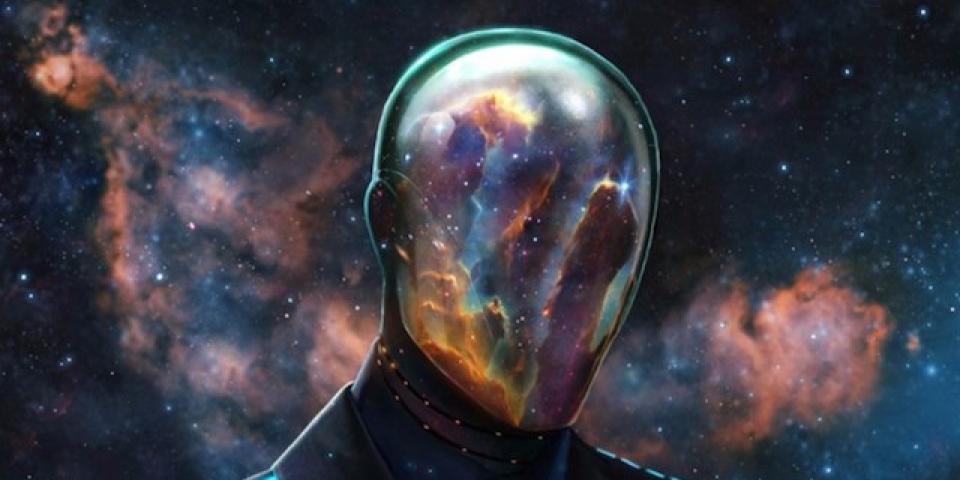A dark shadowline slowly rises on the opposite wall of the gorge as the sun nears the horizon behind me. One’s shadow is thrown across the chasm near a huge crack in a massive slab of volcanic rock.
 Vultures swoop in so low and close that you can’t help but wonder why. I can feel their awareness, albeit no doubt in the context of whether the human sitting on the edge of the gorge is a potential meal.
Vultures swoop in so low and close that you can’t help but wonder why. I can feel their awareness, albeit no doubt in the context of whether the human sitting on the edge of the gorge is a potential meal.
Five wild turkeys gather in the last direct sunlight. One by one they walk to the edge of the chasm, drop off, and clumsily fly to the other side. What a contrast they are with the master gliders on the air!
The mind quiets, and once again one ponders the mystery of man, and the potential of human beings. If the insights I’ve had into the human conundrum (formerly called “the riddle of man”) are correct, the resolution of the basic contradiction between the order of nature/universe and the disorder of man presages the emergence of a new order of consciousness.
They also point to our rightful place in nature and the universe. I submit that until we resolve the existential contradiction within ourselves, humans are not an intelligent species, nor can any other genuinely intelligent species make contact with us.
The conventional thinking goes like this: “On the one hand, it’s possible that no other species has ever reached our state of development. Our galaxy with its 300 billion stars — meaning 300 billion chances for self-consciousness — has never awakened anywhere else. We would be the only ones looking into the night sky and asking questions. How impossibly lonely that would be.”
That’s just plain silly. Self-knowing consciousness hasn’t awakened in humans. Irrespective of technological advance, would we even be able to recognize intelligent life?
In my view we’re looking in the wrong places and in the wrong way for intelligent life. We cannot find intelligence beyond ourselves until we awaken intelligence within ourselves.
The mistake is in thinking in terms of technology, rather than in terms of consciousness. We idolize technology in the digital age as much as the Israelites idolized the golden calf.
We presume human nature is immutable, and that technology will save us. It cannot. Without understanding ourselves, technology will destroy us.
The idea of “the singularity”—“a hypothetical moment in time when artificial intelligence and other technologies have become so advanced that humanity undergoes a dramatic and irreversible change”—is idiotic.
We need to redefine the human singularity. It isn’t some ridiculous synthesis between man and AI, but the point at which the self-made darkness in human consciousness reaches maximum saturation and ignites, allowing humans make the leap to human beings.
This testable “theory of human nature” is that wherever creatures evolve that are capable of separating ‘things’ from their environments and consciously manipulating them, they fragment their planets and themselves in direct proportion to their increasing knowledge and technology. The antidote is an explosion of insight into symbolic thought.
Lifeforms with “higher thought” generate a crisis of consciousness produces increasing pressure for conscious transmutation. The beings that make the transition join a cosmic brotherhood and sisterhood, and are able to communicate with each other. Those that don’t, perish.
Is this the solution to the “Fermi Paradox,” named after the renowned physicist Enrico Fermi?
Fermi, while having lunch with colleagues (including Edward Teller, father of the hydrogen bomb) near Los Alamos National Laboratory in 1950, agreed that intelligent life is probably common in the universe. But he famously asked, “Then where is everybody?”
As has been reported, the logic goes like this: If just one high-tech alien species emerges and starts sending ships out at one-hundredth of the speed of light, the propagating wave of colonization could make it from one end of our Milky Way to the other in just 10 million years, which is just a blink of the eye to the 10-billion-year-old Milky Way.
However, given the likely “prime directive” of non-interference in the transmutation of a potentially intelligent species, we cannot expect to be contacted, and should not expect to find intelligent life until we become intelligent life ourselves.
If this is true, wormholes aren’t necessary. We transcend space-time when we end egocentrism and psychological time—the false, cumulative construct of ‘higher thought’ that is the source of man’s increasing darkness.
It may be that beings that have made the leap to cosmic consciousness exist in a dimension that makes even the most advanced technology a paltry thing.
It may be that by transcending space-time in consciousness, the speed of light and the speed of thought are no longer barriers to direct contact and communion with other intelligent beings, on this planet and beyond.
Martin LeFevre

